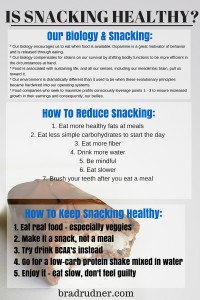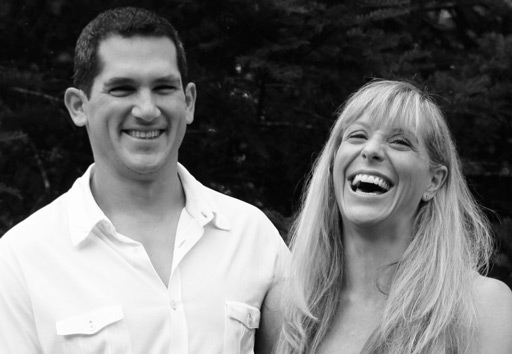There’s been a lot of back and forth on the question of: is snacking healthy?
I use to try to eat 3 meals a day and 3-4 snacks, as an attempt to boost muscle gain and keep a fast metabolism. I thought it was the best thing to do.
Often people applaud the health benefits of snacking by referring to grazing animals, like deer, who consistently and relentlessly eat at every opportunity they can. On the other hand, animals, like lions and wolves, eat large meals and then go long stretches without having anything.
So, is snacking healthy when it comes to human consumption habits?
[Summary infographic is provided at the end & if you want to listen to the article while you drive, walk the dog, go to the gym, cook or just dance, here it is: Is Snacking Healthy?]
You’ve probably heard that eating multiple small meals a day keeps your metabolism going and this helps you burn more fat. Similarly, you might’ve heard that if you have a too calorically-restricted diet, your metabolism gets sluggish because your body, trying to survive what it perceives as a famine, compensates by storing fat.
I’m sure you have heard that if you eat more calories than you burn, you will gain weight.
Have you heard about the fat loss advantages and therapeutic value of intermittent fasting?
Are you aware of the concern about always having elevated blood sugar levels and never giving your body a break from digestion?
Confused? That’s natural. There’s a lot of conflicting information out there. Let’s try and make some sense of it.
Let’s start at the beginning, or at least, waaaay back…
When we were hunter-gatherers we didn’t always have lots of food. In fact, sometimes we were battling starvation. Due to seasonal changes, harsh weather, poor hunting opportunities and unsuccessful foraging, we had to go extended periods without a good meal. We adapted to survive in these nutritionally-challenging circumstances, or we wouldn’t be around today.
What does that mean and how is it relevant today?
Well, a bunch of things but let’s sum it up.
- Our biology encourages us to eat when food is available. In fact, dopamine, the pleasure-inducing neurotransmitter that is a great motivator of behavior, is released through eating.
- Our biology compensates for strains on our survival by adjusting our hormone levels and other bodily functions to be more efficient in the circumstances at hand.
- Food is associated with sustaining life and all our senses, including our mesolimbic brain, pull us toward it.
- Our environment is dramatically different than it used to be when these evolutionary principles became hardwired into our operating systems.
- Food companies who seek to maximize profits consciously leverage points 1 – 3 to ensure increased growth in their earnings and consequently, our bellies.
So, is snacking healthy? I wish it were so simple.
The easy answer is: it’s unnecessary. To make snacking healthy requires the power of the frontal lobe to act with forethought. There’s very little reason to snack if you eat nutrient-dense, appropriately-sized meals that take care of your calorie requirements which relate to your activity levels, body composition, and goals.
Snacking also interrupts your productivity. If you are not drawn to food as often, you can get more done which will probably increase your sense of fulfillment, confidence and resolve to carry on this way.
It’s not our fault that we are drawn to snack, this is our evolutionary biology speaking up. If our environment was not one of abundance, this type of hardwiring would serve us well. However, you barely need to move to be bombarded with snack options wrapped in bright colors that have been cleverly associated with positive emotions through aggressive marketing.
The food companies actually have scientists that use scent, “bliss point”, as well as neurochemistry, addiction, and psychology research to increase our desires to have more. We are not controlling our desires, they are. If this seems far-fetched, read the book, ‘Fat Sugar Salt‘.
Snacking can make you sick if it runs amok and is loaded with the crap made by the food companies who prize your wallets’ loyalty but not your continued health.
- Consistent eating will tire out your pancreas and your liver, potentially leading to diabetes and non-alcoholic fatty liver disease (NAFLD).
- Sustained increased calorie consumption does lead to fat gain which puts you at risk for metabolic syndrome, high blood pressure, heart disease, mobility issues, compromised respiratory functions and increased joint pain as well as other complications.
- Perpetual snacking will increase your food costs and potential exposure to additives, preservatives, growth hormones, antibiotics, pesticides, and other artificial harmful, and maybe even allergy-producing, foods.
Still, sometimes snacking can be a good strategy to avoid ravenous overconsumption of the wrong foods during meals. Snacking can also help preserve your willpower (I wrote about some other ways in the linked article). In fact, if you are tired, stressed out or otherwise depressed, your willpower is certainly not at a robust level and you’ll likely be drawn to snack for reasons that have nothing to do with hunger and nutrition.
This is not snacking healthy. This is eating for when you need quick energy to stay awake; for soothing cortisol levels through ingestion of comfort foods; for ineffectively dealing with boredom; or for lighting up the pleasure centers in the brain in an attempt to lift you out of your funk.
Here’s my Tweetable to keep snacking healthy:
I snack because I am hungry for real food, not because I've been manipulated by Big Food Click To TweetHere are 7 ways to reduce or avoid snacking:
1. Eat more healthy fats at meals – foods like EVOO, avocado oil, coconut oil, organic grass-fed beef, etc. will satiate and provide you with nutrient-rich infusion to keep hunger away for longer.
2. Eat less simple carbohydrates to start the day – a day started with cereal, granola, muffins, toast or juice will give you a quick boost of energy but just as quickly have you hungry again and feeling fatigued. Go for steak and eggs, a green smoothie, a protein shake or even fish and a salad to start your day.
3. Eat more fiber – fiber will slow the release of sugar into the blood and result in more sustained energy, less hunger, and better digestion. You get a lot of good fiber from vegetables and green smoothies.
4. Drink more water – often the feeling of hunger is mistaken and we are really thirsty. Staying hydrated will reduce cravings and improve all functions, mental and physical. Start the day with a big glass of water and keep it going consistently.
5. Be mindful – Pay attention to your body, your mind and listen to your gut. “Are you truly hungry?” Know when you are eating for another reason and substitute something else in instead – a walk, play some music, read something enjoyable, etc.
6. Eat slower – This greatly improves digestion by stimulating the digestive enzymes in your mouth and along the digestive tract. It also gives your body time to recognize how full you are. Try chewing 10-20 times for each bite, you’ll be amazed at the shifts in body composition, appreciation of food and the tastes you notice.
7. Brush your teeth – If you brush your teeth after you eat or when you think you’re going to snack for the wrong reasons, you’re more likely to wait longer before having that next bite.
Let’s be realistic, sometimes you’re going to snack. Sometimes, snacking is healthy. For instance, if you are training really hard, it’s important you don’t deplete yourself too much. This can cause the body to compensate because it feels you are in danger.
Compensentuary reactions such as hormonal shifts can cause a cascade of complications from adrenal fatigue to insomnia to catabolism to injury and more.
If you are going to munch between meals, here’s some tips to keep snacking healthy:
- Eat real food – especially veggies
- Make it a snack, not a meal
- Try drinking BCAA’s instead
- Go for a low-carb protein shake mixed in water
- Enjoy it – eat slow, don’t feel guilty
So, there you have it. I hope you can see why snacking is not necessary, how to control it better and how to approach it so you can make snacking healthy. We don’t live in the environment that our biology adapted to anymore. This means we have to use our brains, at least, the most recent addition to them, to be smart in our approach to healthy snacking and lifestyle in general.
To sum it up:

What do you think? Are you a snacker or not? Do you have any snacking tips?

